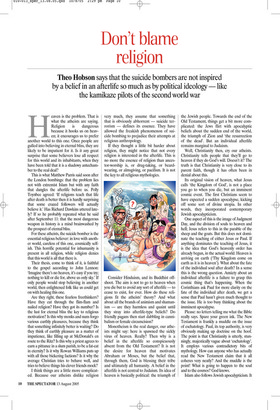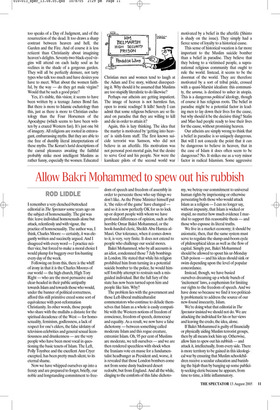Don’t blame religion
Theo Hobson says that the suicide bombers are not inspired by a belief in an afterlife so much as by political ideology — like the kamikaze pilots of the second world war
Heaven is the problem. That is what the atheists are saying. Religion is dangerous because it hooks us on heaven; it encourages us to prefer another world to this one. Once people are gulled into believing in eternal bliss, they are likely to be impatient for it. Is it any great surprise that some believers lose all respect for this world and its inhabitants, when they have been told that it is a shadowy antechamber to the real deal?
This is what Matthew Parris said soon after the London bombings: that the problem lies not with extremist Islam but with any faith that dangles the afterlife before us. Polly Toynbee agreed: ‘If religions teach that life after death is better then it is hardly surprising that some crazed followers will actually believe it.’ Has Richard Dawkins uttered lately? If so he probably repeated what he said after September 11: that the most dangerous weapon in history is a mind brainwashed by the prospect of eternal bliss.
For these atheists, the suicide bomber is the essential religious believer: in love with another world, careless of this one, cosmically selfish. This horrific potential for inhumanity is present in all religion, while religion denies that this world is all that there is.
Their thesis, come to think of it, is faithful to the gospel according to John Lennon: ‘Imagine there’s no heaven, it’s easy if you try; nothing to kill or die for, above us only sky.’ If only people would stop believing in another world, then enlightened folk like us could get on with healing this one.
Are they right, these fearless freethinkers? Have they cut through the flim-flam and nailed religion? Have they got its number? Is the lust for eternal bliss the key to religious motivation? Is this why monks and nuns forgo various earthly pleasures, because they think that something infinitely better is waiting? Do they think of earthly pleasure as a matter of impatience, like filling up at McDonald’s en route to the Ritz? Is this why a priest agrees to earn a pittance in a slum parish, to be a fat-cat in eternity? Is it why Rowan Williams puts up with all those bickering factions? Is it why the average Christian tries to behave well, and tries to believe things his clever friends mock?
I think things are a little more complicated. Because our atheists dislike religion very much, they assume that something that is obviously abhorrent — suicide terrorism — defines its essence. They have allowed the freakish phenomenon of suicide bombing to prejudice their attempts at religious anthropology.
If they thought a little bit harder about religion, they might notice that not every religion is interested in the afterlife. This is no more the essence of religion than ancestor-worship is, or drug-taking, or beardwearing, or almsgiving, or pacifism. It is not the key to all religious mythologies.
Consider Hinduism, and its Buddhist offshoot. The aim is not to go to heaven when you die but to avoid any sort of afterlife — to cease to exist, for ever. How do these religions fit the atheists’ theory? And what about all the brands of animism and shamanism — are they harmless and quaint until they stray into afterlife-type beliefs? Do friendly pagans then start dabbling in cannibalism or female circumcision?
Monotheism is the real danger, our atheists might say: here is spawned the sickly virus of heaven. Really? Then why is a belief in the afterlife so conspicuously absent from the Old Testament? It is not the desire for heaven that motivates Abraham or Moses, but the belief that, through them, God is blessing their tribe and ultimately all humanity. A belief in the afterlife is not central to Judaism. Its idea of heaven is basically political: the triumph of the Jewish people. Towards the end of the Old Testament, things get a bit more complicated: the Jews flirt with apocalyptic beliefs about the sudden end of the world, the triumph of Zion and ‘the resurrection of the dead’. But an individual afterlife remains marginal to Judaism.
Well, Christianity then, cry our atheists. Christianity tells people that they’ll go to heaven if they do God’s will. Doesn’t it? The truth is that Christianity is very close to its parent faith, though it has often been in denial about this.
Its original vision of heaven, what Jesus calls ‘the Kingdom of God’, is not a place you go to when you die, but an imminent cosmic event. The first Christians seem to have expected a sudden apocalypse, kicking off some sort of divine utopia. In other words, they incorporated contemporary Jewish apocalypticism.
One aspect of this is the image of Judgment Day, and the division of souls to heaven and hell; Jesus refers to this in the parable of the sheep and the goats. But this does not dominate the teaching of either Jesus or Paul. If anything dominates the teaching of Jesus, it is the idea that God’s heavenly order has already begun, in the actual world. Heaven is arriving on earth (‘Thy Kingdom come on earth as it is in heaven’). What about the fate of the individual soul after death? In a sense this is the wrong question. Anxiety about an individual afterlife is a failure to grasp this cosmic thing that’s happening. When the Corinthians ask Paul for more clarity on the fate of the individual after death, we get a sense that Paul hasn’t given much thought to the issue. He is too busy thinking about the imminent apocalypse.
Please: no letters telling me what the Bible really says. Spare your green ink. The New Testament is frankly a muddle on the issue of eschatology. Paul, its top authority, is very obviously making up doctrine on the hoof. The point is that Christianity is utterly, stunningly, majestically vague about ‘eschatology’. It employs various contradictory bits of mythology. How can anyone who has actually read the New Testament claim that it all coheres very neatly? And the muddle is the point! What is going to happen to the soul and to the cosmos? God knows.
Islam also follows Jewish apocalypticism. It too speaks of a Day of Judgment, and of the resurrection of the dead. It too draws a sharp contrast between heaven and hell, the Garden and the Fire. And of course it is less reticent than Christianity about imagining heaven’s delights. Seventy-two black-eyed virgins will attend on each lucky soul as he reclines in the shade of a gorgeous garden. They will all be perfectly demure, not tarty types who talk too much and have desires you have to meet. What about the women faithful, by the way — do they get male virgins? Would that be such a good prize?
Yes, it’s risible, this vision; it seems to have been written by a teenage James Bond fan. But there is more to Islamic eschatology than this, just as there is more to Christian eschatology than the Four Horsemen of the Apocalypse (which seems to have been written by a crazed Western fan). It’s just one bit of imagery. All religions are rooted in extravagant, embarrassing myths. But they are able to rise free of dumbly literal interpretations of these myths. The Koran’s lurid descriptions of the carnal pleasures awaiting the faithful probably strike most intelligent Muslims as rather funny, especially the women. Educated Christian men and women tend to laugh at the Adam and Eve story, without disrespecting it. Why should it be assumed that Muslims are too stupidly literalistic to do likewise?
Perhaps our atheists are getting impatient. The image of heaven is not harmless fun, open to ironic readings! It kills! Surely I can admit that some religious believers are so fixated on paradise that they are willing to kill and die in order to attain it?
Again, this is lazy thinking. The idea that the martyr is motivated by ‘getting into heaven’ is sixth-form stuff. The first known suicide terrorist was Samson, who did not believe in an afterlife. His motivation was not personal post-mortal gain, but the desire to serve God and his people. Nor were the kamikaze pilots of the second world war motivated by a belief in the afterlife (Shinto is shady on the issue). They simply had a fierce sense of loyalty to a historical cause.
This sense of historical vocation is far more important to the Muslim suicide bomber than a belief in paradise. They believe that they belong to a victimised people, a supranational religious community that ought to rule the world. Instead, it seems to be the doormat of the world. They are therefore motivated by a sort of tribal pride, crossed with a quasi-Marxist idealism: this community, the umma, is destined to usher in utopia. This is a dangerous political ideology, though of course it has religious roots. The belief in paradise might be a potential factor in leading men to lay down their lives for the cause, but why should it be the decisive thing? Stalin and Mao had people ready to lose their lives for the cause, without promising heaven.
Our atheists are simply wrong to think that a belief in paradise is so uniquely dangerous. But will I not concede the point that it can be dangerous to believe in heaven, that in the case of Islam it does often seem to be dangerous? No. It strikes me as a very minor factor in radical Islamism. Some aggressive












































 Previous page
Previous page